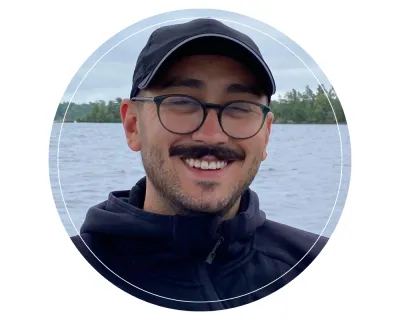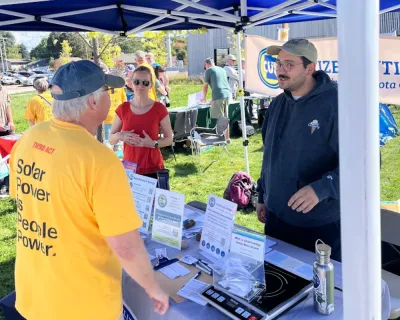Meet Kevin Krantz, CUB’s new Consumer Specialist

Kevin joined the Citizens Utility Board of Minnesota as a Consumer Specialist in September 2025. Prior to joining CUB, he worked on a kaleidoscope of climate resilience planning and sustainability initiatives across Minnesota, including Ramsey County's climate action plan, forest carbon program research in Bemidji, greenhouse gas inventories, resilience hub studies, and even public acceptance of robots! In a previous life, he managed the Punch Pizza where he started as a dishwasher.
In his new role at CUB, Kevin will help Minnesota utility customers understand their bills, use less energy, and navigate home energy upgrades. He’ll be the go-to person for consumers, answering the phones, responding to emails, holding consultations, and attending events across the state. And, he’ll take all of these conversations and work to analyze any trends in utility service to make sure Minnesotans are receiving affordable, reliable, safe, and clean home energy.
Learn more about Kevin below. Say hello if you see him around town!

Share more about your background and what brought you to CUB.
I just got my Master of Science in Science, Technology, and Environmental Policy from the Humphrey School of Public Affairs at the University of Minnesota. While I was there, I co-authored Ramsey County’s 2024-2028 Climate Equity Action Plan, worked at the Great Lakes Environmental Justice Thriving Communities Technical Assistance Center (TCTAC) where I specialized in resilience hubs and funding ID, researched the public acceptance of aquatic robots, and assessed the City of Minnetonka’s wetland and tree residential permit ordinances.
Before that, I was at Bemidji State University getting my Bachelor of Science in Environmental Studies (toxicology focus) with minor studies in GIS. I also studied in the Niizhoo-Gwayakochigewin (“Two Ways of Doing a Good Thing in a Good Way” in Ojibwe language) program, where western science professors and Indigenous knowledge professors braided their methods together to solve problems that neither could alone, while retaining their distinctions.
At BSU, I worked in the Sustainability Office with my mentor, Erika Bailey-Johnson, where we put on cross-cultural events, ran the Free Store, and inventoried campus greenhouse gas emissions. I was also working at the Hubbard County Soil and Water Conservation District visiting landowners and sampling water, coordinating volunteers for a MN House 02B campaign, and writing a white paper with DNR scientist Paul Radomski on forest carbon sequestration programs for Northern Waters Land Trust.
I had come from Minneapolis College where I was organizing with MN350 and cooking at Hai Hai in Northeast Minneapolis. I had just finished an operations management career at Punch Pizza, having started as a dishwasher. I left to work on Climate Action and Sustainability because these are my life passions within Environmentalism. This brought me to CUB, whose decarbonization efforts align with my goals to not fight the climate crisis via unwholesome relationships.
What motivates you when working with Minnesotans who face energy challenges?
I’m motivated by collaborative justice and advocacy, by systemic changes and assistance. I am diminished wherever humankind is diminished and the bell tolls for me (John Donne, 1840). I’m not drawn to work where you show up somewhere to “coddle and assault” the “very very worthy / And beautiful poor” (The Lovers of The Poor, Gwendolyn Brooks, 1963).
I want to hear directly from communities and work in service to them. I want to deliver tangible benefits to people on their own terms and advocate for a better system in their own words. I want people to get the assistance that they deserve in a way that works for them. I want to be at an organization that sticks around for the long haul in a thoughtful way without inserting itself everywhere out of self-importance.
I also see the relationship to my climate and sustainability goals. The only way that we can all make responsible decisions is if they are within reach, affordable, and accessible.
What drew you to CUB and this position in particular?
CUB cares about decarbonization AND community. There’s a scholar at Michigan named Kyle Whyte who wrote about the way to (1) fight climate change slowly with good relationships and face some bad climate effects, (2) quickly fight in climate change or (3) a yet-unknown third way where we navigate the complexities like a NASA moon mission (Too late for indigenous climate justice: Ecological and relational tipping points, 2020). I’d like to be a part of the third way. I don’t want a world where slaves breathe clean air, nor one where radically free citizens choke on it. We have to work on both. CUB represents that. Plus, everyone in my network knows CUB and I’ve gotten endless high-fives for working for them, so it feels pretty cool to be at a well-respected organization.
In this Consumer Specialist role, I see my goals to benefit everyday people realized. I know I enjoy these direct interactions from my time at Punch Pizza and the various community engagement efforts that I’ve been a part of in my environmental career. It’s been very nice to do outreach that offers support rather than seeking it. It’s also a way to learn more about consumer energy issues and programs, and a stepping stone to policy work in terms of career development.
I also hope to start integrating my experience in GIS, policy analysis, qualitative and quantitative research, stakeholder collaboration, and science as soon as I can to advocate for consumers. I’m drawn to collaborative, interdisciplinary, creative approaches so I’m curious to see what we can get cooking.

What experiences have prepared you to work directly with consumers on energy issues?
My customer service / management career in a restaurant is augmented by public-facing environmental work such as well water nitrate pollution clinics, surveys and public attitudes research, article and newsletter writing, community conversations, flyering and picketing, and I’d even count being president of the BSU Students for the Environment club as vital training so far.
I’m used to serving people not only as customers, but residents and citizens in a government and non-profit setting. I also coordinated volunteers for door-knocking in Bemidji, White Earth, and Leech Lake so I’ve had tons of experience with impromptu conversations on hot topics.
Are there particular programs, issues, or communities you’re especially interested in supporting?
I’m interested in any climate change or sustainability aspects, community action, state alternatives, water quality, biodiversity, Indigenous sovereignty and rights, compassion for immigrants, international cooperation, non-neoliberal approaches, shifting power to people rather than corporations or even governments. Though, I would like to eventually work on climate resilience for a local government so any benefit to residents is interesting to me.
How do you see the energy landscape changing in Minnesota? What excites you most about being part of that change?
Coal plants will continue to shutter for economic reasons (just look at the LCOEs) as well as climate action reasons. Wind may be hit harder than solar by this presidential administration’s active opposition. We will still build solar, but the economics will change and perhaps slow down. Still, technological advancements could bolster efficiency and the economic argument, but these are also affected by the industry’s slowdown and even by active political opposition to this research.
The Princeton Net Zero America project lays out the paths that vary by cost, land used, and strategy. Each one is onerous, and only growing more so. An energy infrastructure footprint the size of several states, 10% of GDP invested over 10 years, doubling the size of a grid in 20 years that took 100 years to build, it’s all nothing to shake a stick at. And it only gets harder. And then there's the rest of the world too!
All of this infrastructure investment is creating real affordability pressures that we're seeing in the headlines constantly. Utility bills are rising as companies pass the costs of grid modernization, renewable energy transitions, and infrastructure upgrades to ratepayers. These looming increases hit working families hardest, and they're creating political resistance to the very changes we need for climate action. That's exactly why affordability work is so crucial right now: we have to ensure the energy transition doesn't leave people behind economically, or we'll lose the public support needed to see it through. We need to make sure that only sensible costs are paid.
What’s something people might be surprised to learn about you?
I can’t party! Don’t know how!
When you’re not working, how do you like to spend your time?
Playing blues guitar, reading different Daodejing or Zhuangzi translations, learning Ojibwemowin, playing Stardew Valley with my gal pal, reading different translations of post-Vedic Hindu texts like the Gita or the Sutras, sleeping.